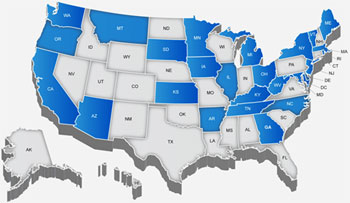As ALEC and Heartland race to push legislation in the states that mandates students be versed in "climate change denial," they’ve got a new foe to work against.
National science standards for schools across the US are about to be released which integrate teaching climate change into public school curriculums.
Coordinated by the non-profit Achieve, these "Next Generation Science Standards" have been developed by 26 states, the National Research Council, the National Science Teachers Association and the American Association for the Advancement of Science.
Starting in elementary school, students would learn the evidence behind human-caused climate change, and it would be incorporated into every kind of science class through high school.
Of the 26 states that collaborated in developing the science standards, seven are among the most populous states. The final standards will be released for adoption this spring.
"We anticipate that 80 to 90 percent of states will either adopt the standards in full or use them to shape their curricula," Jeff Livingston, senior vice president of education policy for McGraw-Hill told InsideClimate News. Livingston, from McGraw-Hill. "We can’t ignore that."
Blue states participated in developing the standards:

The last update of these standards was 15 years ago, so the priority was to make sure students receive information on the latest science, Heidi Schweingruber of National Research Council told InsideClimate. "This is particularly important for evolution and climate change, which have become so politicized that scientists and educators fear students can’t separate scientific fact from religious beliefs or political opinion," she says.
Because of this politization, many teachers avoid the subject altogether.
The standards go beyond these subjects to cover science as a whole:
"The second public draft of the Next Generation Science Standards is a significant step forward in developing exemplary new standards that all states can support. When completed and adopted, these new science standards will change the way science is taught and learned in classrooms nationwide by fully engaging K-12 students in three essential dimensions -disciplinary core ideas, scientific and engineering practices, and crosscutting concepts – in a way that will deepen and strengthen their knowledge and skills in science," says the National Science Teachers Association.

This has been a long awaited step for many of us in California. The value of an education should be measured in “IRL” units, that is in how graduates are able to use their knowledge “in real life” outside of the classroom. Environmental awareness and ocean literacy are critical areas of focus, and an emphasis on their importance is long overdue.